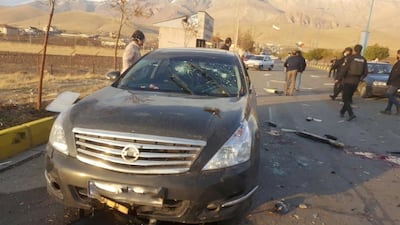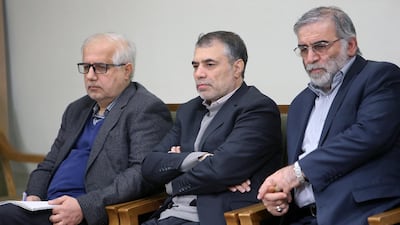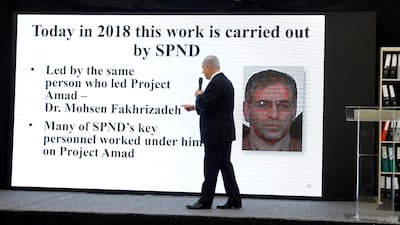Iran's President Hassan Rouhani on Saturday accused Israel of being behind the assassination of Iran's top nuclear scientist, saying it was acting as a "mercenary" for the United States.
Mohsen Fakhrizadeh, long suspected by the West of masterminding a secret atomic weapons programme, was killed in attack near Tehran on Friday.
"Once again, the wicked hands of the global arrogance, with the usurper Zionist regime as the mercenary, were stained with the blood of a son of this nation," Mr Rouhani said on his official website.
Iran's supreme leader Ayatollah Ali Khamenei ordered that the "perpetrators of the terror crime should be punished", according to state news agency Irna.
Iranian Foreign Minister Mohammad Javid Zarif suggested Israel's involvement in a tweet on Friday announcing Fakhrizadeh's death in hospital after “assassins” fired on his car.
A statement released by the Iranian Defence Ministry said the scientist was accompanied by a security detail at the time of the attack.
“During the clash between his security team and the terrorists, Mohsen Fakhrizadeh was seriously injured and taken to hospital,” it said. "Unfortunately, the medical team did not succeed in reviving him."
Israel declined to immediately comment on the killing. Israeli Prime Minister Benjamin Netanyahu once called out Fakhrizadeh in a news conference saying: “Remember that name.” Israel has long been suspected of carrying out a series of targeted killings of Iranian nuclear scientists nearly a decade ago.
“Assassinating nuclear scientists is the most violent confrontation to prevent us from reaching modern science,” Hossein Salami, chief commander of Iran's Islamic Revolutionary Guard Corps paramilitary, tweeted after the attack on Friday.
The UN called for restraint. “Of course we condemn any assassination or extra-judicial killing," said Stephane Dujarric, spokesperson for Secretary-General Antonio Guterres. "We urge restraint and the need to avoid any actions that could lead to an escalation of tensions in the region.”
Fakhrizadeh had long been described by Western, Israeli and Iranian exile foes of Iran's clerical rulers as a leader of a covert atom bomb programme halted in 2003. Iran has denied seeking to weaponise nuclear energy.
The United States slapped sanctions on Fakhrizadeh in 2008 for "activities and transactions that contributed to the development of Iran's nuclear programme".
Tasnim and Fars news agencies, both close to security sources, said the attack was at Absard city in Tehran province's eastern Damavand county, with "terrorists bombing a car before shooting at Mr Fakhrizadeh's car".
US President Donald Trump on Friday retweeted reports on the assassination, without commenting on it himself.
Others wounded, including Fakhrizadeh’s bodyguards, were later taken to a local hospital, Fars said.
State television on its website later published a photograph of security forces blocking off the road. Photos and video shared online showed a Nissan sedan with bullet holes through windshield and blood pooled on the road.
No group has claimed responsibility for the attack.
Hossein Dehghan, an adviser to Iran’s supreme leader and a presidential candidate in Iran’s 2021 election, said on Twitter: “In the last days of their gambling ally’s political life, the Zionists seek to intensify and increase pressure on Iran to wage a full-blown war”, appearing to refer to Mr Trump.
The area around Absard is filled with vacation villas for the Iranian elite, with a view of Mount Damavand, the highest peak in the country. Roads on Friday, part of the Iranian weekend, were emptier than normal due to a lockdown to combat the coronavirus pandemic, offering his attackers a chance to strike with fewer people around.
Fakhrizadeh led Iran’s so-called “Amad,” or “Hope” programme. Israel and the West have alleged it was a military operation looking at the feasibility of building a nuclear weapon in Iran. Tehran long has maintained its nuclear programme is peaceful.
The International Atomic Energy Agency says that the “Amad” programme ended in the early 2000s. IAEA inspectors now monitor Iranian nuclear sites as part of Iran’s now-unravelling nuclear deal with world powers.























